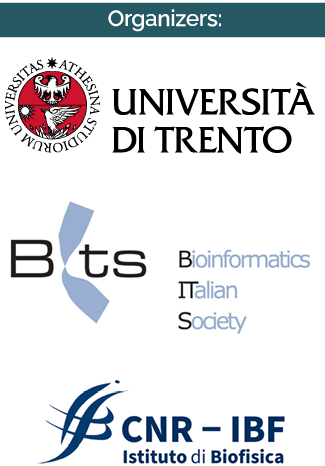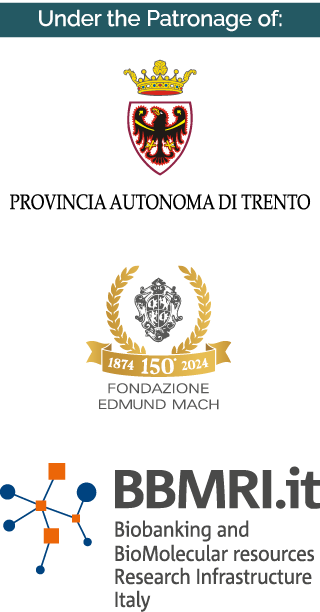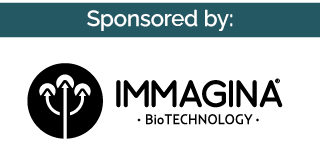Abstract submission is requested for poster and oral contributions to the annual meeting of the Bioinformatics Italian Society (BITS).
The following topics are covered during the conference (but are not limited to):
- Bioinformatics Core Facilities and Research Infrastructures
- Bioinformatics AI, Models and Tools
- Data management sharing and FAIRness
- Omics and Multi-Omics
- Systems Biology
- Translational, Clinical and Industry Bioinformatics
- Proteins
- Miscellaneous
In addition to the traditional panels, the Call includes topics for a High Resolution RNA Computational Biology session, a workshop titled Cosmic codes: Bridging Space Explorations and Bioinformatics, and a Young BITS-RSG-InfoLife Symposium.
High-Resolution RNA Computational Biology Session
RNA molecules are post-transcriptionally modified and dynamically interact with RNA-binding proteins and other RNAs to form ribonucleoprotein complexes (RNPs), or with ribosomes and polysomes for protein synthesis. This complex network of modifications and interactions ultimately regulates the existence and function of RNAs within cells. Physiological RNA modifications, interactions, structures and translation are frequently altered in human pathologies such as neurodegenerative diseases and tumours. Next-generation sequencing techniques with nucleotide resolution, such as CLIP-Seq, SHAPE-seq or ribosome profiling, are essential to obtain comprehensive maps of protein-RNA, RNA-RNA, RNA-DNA, RNA-ribosome interactions, RNA modifications and editing, RNA structures with nucleotide resolution.
Thanks to the revolution of single-cell RNA-seq, we can look at thousands of cells one at a time, measure which set of RNAs each individual cell is transcribing, and capture the cellular diversity of tissues with unprecedented resolution. Single-cell and spatially resolved transcriptomics analysis requires the parallel development of appropriate computational methods for the identification of cell types, gene regulatory networks, spatial expression patterns and dependencies.
This session welcomes contributions on the topic of high-resolution RNA computational biology: single-nucleotide resolution, single-cell resolution, spatial transcriptomics, RNA multi-omics.
Cosmic codes: Bridging Space Explorations and Bioinformatics (Workshop)
To prepare humans for future exploration missions far from Earth, Space Biology research aims to understand how spaceflight affects living systems in environments such as the International Space Station (ISS).
How do animals, plants and microbes adjust metabolism, growth, development or stress response when living in space? How do organisms repair cellular damage and protect themselves from infection and disease in microgravity while being exposed to space radiation?
This workshop welcomes contributions on the topic of computational approaches applied to space biology.
Young BITS-RSG-InfoLife CINI Symposium
Co-organized with RSG-Italy, the Italian Regional Student Group of ISCB, and the CINI InfoLife young group, the Young BITS-RSG-InfoLife CINI Symposium provides a supportive and stimulating forum in which undergraduate, master and PhD students, as well as young researchers, have the opportunity to present and discuss their research with other members of the Italian Bioinformatics community.
Abstract selection for oral and poster presentations
The abstracts will be reviewed by the Scientific Committee and accepted for oral or poster presentation, or rejected in case they do not match the scientific standards of the conference. Each abstract will be reviewed by two or three anonymous referees.
We encourage the authors to use the maximum space available in the submission to describe at best their work and results. Accepted abstracts will be collected in the conference proceedings.
Presentation of selected contributions requires early registration to the conference of the presenting author after the acceptance notification. Each participant can submit up to one abstract for oral communication and one or two posters.
Call for Travel Grants
Eligibility
Researchers without a permanent position and submitting an abstract to the conference as first, last or presenter author may apply to the BITS2024 Travel Grant program.
Evaluation
Travel Grants will be awarded based on the scores assigned by the Scientific Committee to the submitted abstracts. Only abstracts with an average score of at least 3 out of 5 will be eligible for consideration. Each research group may have only one attendee awarded a travel grant, and it will be the highest-scoring applicant from that group. In the initial round of grant assignments, priority will be given to applications submitted by researchers under 35 years of age and BITS members. If there are remaining grants after this round, a second round will consider applications from all other BITS members. Finally, if grants are still available, a last round will consider applications from non-BITS members who have applied for membership. Within each round, if there are applicants with the same score, priority will be given to researchers who have participated in previous BITS meetings and have not previously received a BITS Travel Grant.
Travel Grants Award
Travel Grant will be credited to the bank account after the conference. Selected candidates have to provide: the attendance certification, their scientific contribution and a declaration of sustained costs, with the specific statement that these are not reimbursed by other sources. The winners will receive a grant amounting to € 300.00. Reimbursements must be asked to tesoriere[at]bioinformatics.it.
The travel grant request must be submitted by the following link
POSTER Instruction
Poster size: A0 (84,1 cm x 118,9 cm) in vertical orientation. Details regarding the specific location of the posters at the meeting will be given at the check-in.



